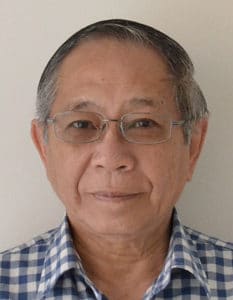Christians of different traditions have enough in common to be able to unite and work for a better world.

Fr Bernard Teo CSsR
This was stressed by Fr Bernard Teo, CSsR, a doctor of sacred theology and lecturer in moral theology at Te Kupenga – Catholic Theological College, who talked on October 22 about the responses of the World Council of Churches and Pope Francis to the environmental crisis. The talk took place at the St Columba Centre in Ponsonby, Auckland.
Fr Teo’s talk was part of a year-long series sponsored by the Auckland Diocese Commission for Ecumenism, in celebration of the 25th anniversary of St John Paul II’s encyclical Ut Unum Sint – That They All May Be One.
Fr Teo presented the statement released by the World Council of Churches on the climate change emergency, released on December 2, 2019, and Pope Francis’ encyclical Laudato Si’.
“There are plenty of common grounds between the WCC’s statement and Pope Francis, though Pope Francis grounded his statement on a more comprehensive level of theology and spirituality. In fact, he is taking us back to spirituality, asking humanity to develop a sense of wonder and gratitude for the gift of creation and life,” Fr Teo said.
The WCC statement, he said, recognised that “the climate crisis is not a distant prospect, but is upon us today”.
“It cited and accepted recent experiences of extreme destructive weather events of increasing strength and frequency around the world, from Latin America to the USA, to Japan, Australia, to different parts of Asia and subcontinent Asia and Africa, and their impact on our communities – especially the poorest and most vulnerable among us,” Fr Teo said.
The WCC expressed “bitter disappointment” about the inadequate, or in some cases total lack of, response of governments to the crisis, and called on their member churches, ecumenical partners and people of goodwill to join in the effort of confronting this global crisis.
In Laudato Si’ (2015), Pope Francis acknowledged the twin crises of climate change and the unresolved issues of global hunger and poverty, which is really just one complex environmental and social issue, Fr Teo noted.
In Laudato Si’, Fr Teo said, the Pope engages his readers on three levels: science, faith and reasoned ethics.
On the first level, Pope Francis accepted the overwhelming consensus of the majority of scientists that global warming is a real threat. “He is reporting the consensus of scientists, whose competence he acknowledges”, Fr Teo said.
On the level of faith, Pope Francis introduced what Australian philosopher Joseph Camilleri described as a “seismic shift” in mainstream Christian thought: that “human life is essentially defined in its relationship to God, to others and to the earth”, Fr Teo said.
The third level is the ethical response. Pope Francis “is calling for a commitment by everyone to living responsibly so that others can live a fulfilling and happy life”, Fr Teo said. “We should be striving ‘boldly and responsibly to promote a sustainable and equitable development within the context of a broader concept of quality of life’.”
Fr Teo said that the Pope’s latest encyclical, Fratelli tutti, reinforces his message of people living for others.
“A lot of the values that [are] being promulgated (today) [are] really about consumerism. It captures all areas of life and governs all areas of life. But there is a reaction to that. Because it’s never satisfying, it’s never enough,” he said. “Progress should really be about us becoming more human together.”
Reader Interactions